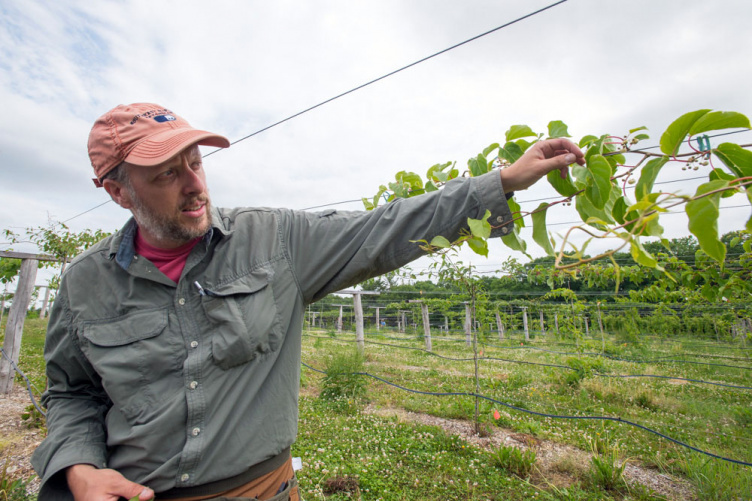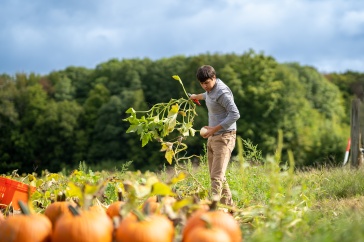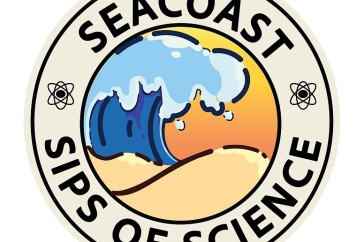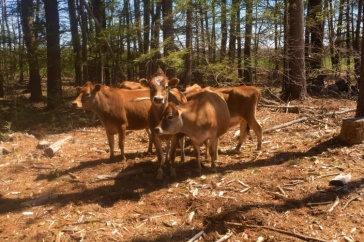
Whether for fresh eating, winemaking or other value-added products, UNH professor Iago Hale is hopeful his research will lead to the establishment of a hardy kiwi industry in New Hampshire.
The first time Iago Hale popped a cold-hardy kiwifruit in his mouth, he was left speechless, amazed that he had never encountered the delicious fruit before. Now the researcher with the New Hampshire Agricultural Experiment Station at UNH is a hardy kiwifruit breeder working to develop the small, sweet fruit into a new high-value crop for New England farmers.
“Hardy kiwis are well-suited to the relatively small and diverse farms that dot the New England landscape," says Hale, a plant breeder and assistant professor of specialty crop improvement at UNH’s College of Life Sciences and Agriculture. Cultivated by hobbyists and backyard gardeners in the Northeast for nearly 150 years, these species show great commercial potential in the region. Until now, however, they have lacked the necessary support of a public breeding program to develop high-performing varieties and demonstrate their economic viability to producers. "We’re going to change all that,” says Hale.
“By establishing a long-term breeding program for hardy kiwis on experiment station land, the New Hampshire Agricultural Experiment Station aims to support our region's producers and consumers through the development and dissemination of this novel crop,” Hale says.

At UNH, professor Iago Hale is growing nearly the entire USDA collection of hardy kiwis, about 150 accessions, in order to characterize the collection and identify parent plants for his breeding program. This first observational vineyard was planted in 2012, and Hale will see a first harvest this fall.
Hardy kiwis first were appreciated for their ornamental value, covering cottages and trellises in estate gardens throughout the region. The leaves of some varieties turn a lovey white then rosy hue in early summer, and the smell of the small, white flowers is similar to that of gardenias or Lily of the Valley. By the mid-1900s, the excellent eating quality of the berry-like fruit was starting to be appreciated as well. In the 1960s, UNH botanist Edwin Meader brought hardy kiwis he collected in Korea after serving in the U.S. Army to his farm in Rochester. One of his selections (Meader male) remains one of the most prevalent and preferred hardy kiwi cultivars offered by nurseries today.
“Hardy kiwis are nutritionally dense, a superfood, with extremely high levels of vitamin C, beta-carotene, anthocyanins and lutein. They are remarkably sweet and flavorful fruits that are about 25 percent sugar. And given their complex flavor profile, with hints of tropical fruits with a nice acidity, some producers even use them for winemaking,” Hale says.
Hermit Woods Winery of Meredith makes two wines using hardy kiwis and has plans for a third. According to co-owner Bob Manley, both kiwi wines sell out every year, and hardy kiwis have become an important part of the company’s wine production. “They are unique in that they are the rare fruit that can produce sugar levels equal to or higher than grapes, especially grapes grown in this region,” Manley says. “Since Hermit Woods has had so much success with the kiwi berry in our wines, other wineries have either begun to or are already producing kiwi wines as well.”
The company currently gets its hardy kiwis from Pennsylvania. “Ideally we would like to be able to procure our fruit from local farmers," Manley says. "The shipping costs alone to get the fruit from Pennsylvania drive our price up. If we could identify farmers in the area that could produce good quality organic fruit, we would be willing to pay top dollar for it."
Whether for fresh eating, winemaking or other value-added products, Hale is hopeful his research will lead to the establishment of a hardy kiwi industry in New Hampshire. To that end, he is already working with two northern New Hampshire farmers in Coos County who are interested in diversifying their crops with hardy kiwis.
Kitty Kerner and her family operate WinterGreens Farm and Aquaponics in North Stratford, a small farm that has to contend with a short growing season and hard winters. The family has been working to expand its selection of high-value crops, and according to Kerner, “hardy kiwis seemed just right for our challenging climate, given their native habitat is Siberia!”
“We are excited to be part of professor Hale's kiwi selection trials and believe this crop has great potential as a new opportunity for farmers in New England — especially in the northern areas."
“We are excited to be part of professor Hale's kiwi selection trials and believe this crop has great potential as a new opportunity for farmers in New England — especially in the northern areas," Kerner says, adding that with any new product, it will take some effort to introduce the hardy kiwis to consumers and convince them how great they are. Should the kiwis become successfully established, Kerner hopes to expand the vineyard and explore their potential use for value-added products such as wine, jams and dried fruit.
Like Kerner, Pierre Miron of New Earth Organic Farm in Colebrook sees hardy kiwis as a potential to diversify his crops. Its potential demand and ability to survive Northern New Hampshire’s cold climate and store for up to two months appeal to him.
“For me, hardy kiwis could become a good complement to what I offer to my customers," Miron says. "I have been farming for eight years in Colebrook and I know, to be realistic, I need to do my own experiment at my farm and see how it is doing here." He says the work with Hale will result in the most suitable varieties for the North Country. "I am already preparing another section in the garden to expand. I am very optimistic,” Miron says.
This material is based upon work that is supported by the National Institute of Food and Agriculture, U.S. Department of Agriculture, under award number 233561.

















































